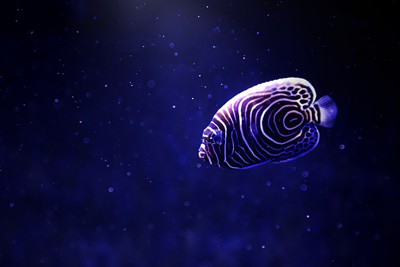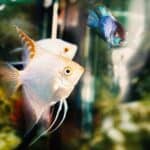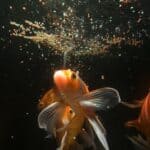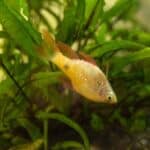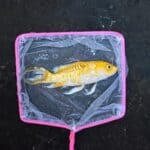Fish have surprisingly good vision. Their eyes are similar to ours, but because their lenses are harder and more spherical, they see things closer up.
While they can see things in front of them, they struggle to see well in complete darkness.
Fish can see in the dark as long as there’s some light. The retina captures greater light frequencies, sending them to the brain for visual recognition.
It’s unlikely that fish will see much, if anything, through their eyes in the absence of light.
Fish navigate in complete darkness using their lateral line. This is a sensory organ that detects movements and changes in water pressure, alerting fish to things that are nearby, like other fish and food.
Darkness is essential to fish, as they’re diurnal. That means they sleep during the day.
When keeping aquarium fish, turn all the lights off to replicate pitch-black conditions. This ensures the fish can sleep and conserve their energy.
Do Fish See In The Dark?
As mentioned, despite misconceptions, fish have excellent vision. Though they can’t see well from a distance, they can see up to one meter clearly in good water conditions.
However, when it comes to total darkness, fish struggle to see well. While all fish have some level of night vision, they need an element of light to see anything.
Light illuminates colors in the water, making it easier for fish to navigate their surroundings and see other animals and dangers lurking nearby.
That said, some fish are better at seeing in darkness than others, especially if they live further down beneath the water’s surface and are used to darker conditions.
For example, some deep-sea fish emit and detect bioluminescence, which is a form of blue light.
As described by Smithsonian Magazine, 50% of deep-sea inhabitants glow. This allows them to communicate, illuminate their surroundings, and see other fish that haven’t spotted them.
Blue light has an intermediate wavelength, which travels the furthest in water. Water quickly removes all wavelengths, including red and violet, but it doesn’t remove blue.
As a result, a fish’s eyes have adapted to see in blue wavelengths of light.
Similarly, instead of eyesight, many fish rely on their senses to navigate in darkness. Integrative Zoology explains how all living fish have a sensory system called the lateral line.
It allows fish to detect movement, vibration, and pressure changes, allowing them to determine whether predators or prey are nearby. The organ enables them to either hunt or get out of harm’s way.
It also prevents them from bumping into things and injuring themselves.
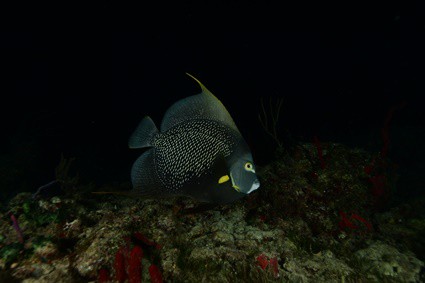
Can Aquarium Fish See In The Dark?
Wild fish living in seas, ponds, and oceans can see due to the light reflected in the water from the moon and stars. This allows them to see shadows and outlines at night.
Aquarium fish living in a completely dark room don’t have this luxury, meaning they’re less likely to see as well. Most captive fish haven’t adapted to see in the dark with their eyes at all.
Aquarium fish don’t need to be able to see at night. That’s because they’re most likely to sleep when it’s dark. When nighttime falls, they stop swimming to conserve their energy.
They don’t have to worry about bumping into things. However, they remain alert in case of danger.
Therefore, to emulate natural conditions, you should leave your aquarium’s lights on for around 12 hours. During regular nighttime hours, turn the lights off so there’s complete darkness.
Similarly, all fish adapt to a period of light. They then adapt to a period of darkness.
That’s why you shouldn’t leave aquarium lights on for 24 hours. Also, fish don’t have eyelids, so they can’t cover their eyes from the light.
If fish are exposed to too much light, their eyes become tired. It’ll also disrupt their sleeping pattern, making them stressed, tired, and anxious.
Stress can lead to health and behavioral problems, including:
- Diseases, such as ich.
- Jumping out of the tank.
- Poor scale quality.
- Aggression.
- Decreased appetite.
- Weight problems.
To prevent these issues, research your aquarium fish’s ideal conditions and replicate them as closely as possible to protect their eyesight and maintain their overall well-being.
While 12 hours is a good starting point, you might find that your fish needs fewer or more hours of complete darkness. You could place a towel or blanket over the tank to ensure total darkness.
Does A Fish Need Darkness?
Darkness is crucial for fish. They need it to rest their bodies and minds, keeping them strong and healthy. Darkness also prevents a range of mental and behavioral problems.
As mentioned, most aquarium fish are diurnal. This means they’re active during the day and sleep at night. As a result, fish need between 8 to 12 hours of darkness each night.
However, this is a broad range, so aim to provide the following level of darkness in the aquarium depending on your tank’s conditions and the types of fish you own:
- A tank with cold-water plants and cold-water fish: 16 hours of darkness each day.
- An average aquarium: 14 hours of darkness each day.
- A tank with tropical plants and fish: 12 of darkness each day.
When it’s dark, fish rest within plants and decorative features where they’re safe and secure.
Similarly, tanks need darkness to regulate the ecosystem. For example, algae grow out of control when there’s too much light. Therefore, darkness keeps algae growth under control, ensuring the tank’s conditions remain sanitary and healthy.
Are Fish Afraid of The Dark?
Fish aren’t scared of the dark because they don’t have the brain capacity to understand the concept. For example, humans associate darkness with scary monsters and unseen shadows.
Similarly, many fish – especially those living deep below the water’s surface – live in dark conditions, so they know nothing different.
For wild fish living in a natural cycle of dark and light, darkness is when their bodies slow down and they can sleep.
However, some aquarium fish may exhibit strange behaviors when the tank goes dark, darting around the tank, bumping into things, and getting tangled in plants.
The most likely reason is that you’ve turned out the lights too quickly. This means that their eyes haven’t adapted to the darkness. The fish can’t see enough to navigate their way around the tank.
While they’re not scared of the dark as such, they’re spooked by the sudden changes in conditions, which creates an element of fear.
To minimize your fish’s stress levels and allow their eyes to adjust to the transmission from light to darkness, leave a dim light in their room for 30 minutes before turning it off completely.
This emulates the conditions from dusk to complete darkness more closely, allowing a fish’s eyes to get used to lower light levels first.
You’ll also need to do the same thing when turning the lights back on, especially if no natural light enters the room your fish are in.
Can Fish See in Dark Water?
As long as there is some level of light, fish can see in dark waters. When the water is dark, a fish’s retina captures larger light frequencies that the lens has focused on, sending them to the brain to produce an image.
While the image may not be obvious, it’s enough for fish to see things immediately in front of them.
But the retina can only do this if enough light infiltrates the water. When the water’s pitch black, the fish won’t be able to do anything.
How much a fish can see in dark waters also depends on:
- Algae.
- The angle of the sun.
- Suspended particles.
- Water clarity.
- Wind action.
- Underwater light penetration.
These factors affect how well a fish can see in dark waters. If the water’s unclear, then fish must use their lateral line in place of their eyesight.
Can Fish See Food in The Dark?
Many fish don’t find food very well in the dark. That’s why most owners feed their fish during the day when there’s plenty of light. However, they will eventually find the food using their sense of smell.
Fish have a set of nostrils, also known as nares, containing two small holes, an inlet, and an outlet. Some flaps separate the two holes while pushing water into the nostrils as a fish swims.
When water enters the nostrils, the fish’s breathing creates a pumping action. The water travels to the rosette, which is where their sensory organs are located.
When water passes over it, the scent detectors identify what’s in the water by analyzing the scent. The water is then flushed out of the fish through the second nostril.
Fish usually use their nostrils to detect chemicals in the water, such as ammonia and nitrites. But it can also help fish locate food within the environment, allowing them to feed when it’s dark.
Similarly, Natural foods like worms and snails leak amino acids into the water, which gives off a distinctive smell, making them easy to locate. This is essential for fish that feed off animals that come out at night.
Should I Feed My Fish At Night?
Because fish can’t see effectively when it’s dark, they may have trouble finding and eating food.
As a result, food in a standard aquarium will decompose and rot, causing ammonia and nitrite levels to rise. This can be fatal for all fish living in the tank.
Also, fish sleep at night, making them less likely to want to eat. When they rest, they reduce their metabolism and brain activity by half. They also sleep with their eyes open, making it look like they’re awake.
As a result, try not to make the mistake of feeding asleep fish as, again, the food will go uneaten, causing the tank’s ammonia levels to rise, making the tank’s conditions unsanitary and potentially harmful.
The best times to feed your fish are early in the morning and again at dusk before they go to sleep.
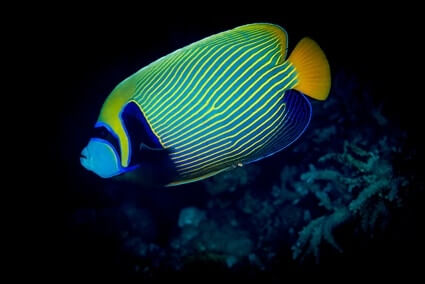
Can Fish Hunt in The Dark?
As discussed, fish mostly rely on their sense of smell and sound to hunt. That’s because they can’t see well enough in the dark as there’s not enough light to see smaller fish, insects, and other foods.
Similarly, many prey fish use the cover of darkness to flee from danger, making it even harder for predator fish. For that reason, most fish hunt using the lateral line system, using it to detect movement from nearby prey fish.
However, not all fish use the lateral line system for hunting. Science Daily explained how elephantnose fish detect prey in dark waters using electric fields.
Researchers found that they have an electrical organ in their tail that emits electrical pulses. These pulses generate a weak electrical field around them.
When objects modify the electrical field, the fish can sense the changes and use the field to seek out worms and insects buried in the mud. It also tells them when a predator is nearby, allowing them to flee.
That’s not to say their eyesight isn’t essential when hunting, as they use both senses. They can also switch back and forth between the two depending on the level of darkness and how well they can see.
So, while most fish can’t see in complete darkness, they can see when there’s a little light. Similarly, most fish, especially those who live in an aquarium, don’t need to see when it’s dark.
That’s because they sleep during the nighttime. That’s why owners must replicate night and day conditions to allow them to rest their eyes.
Similarly, don’t turn out the light too quickly, or fish might have trouble adjusting their eyes to the changing conditions.

